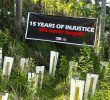3. International and State Responsibility
While the killings are certainly not attributable to the military organization itself, or the State, but only to individuals or groups acting pursuant to their own interests, this does not mean that the State can sit idly by and refuse to act. Ultimately, the State has the responsibility of protecting its citizens and making sure that their fundamental liberties are respected.
The growing worldwide consensus for state responsibility for non-state acts posits that if the State fails to investigate, prosecute or redress private, non-state acts in violation of fundamental liberties, it is in effect aiding the perpetrators of such violations, for which it could be held responsible under international law. Of note is the ruling of The Inter American Court of Human Rights in Velasquez-Rodrigues v. Honduras,[97] viz:
172. [�] An illegal act which violates human rights and which is initially not directly imputable to a State (for example, because it is the act of private person or because the person responsible has not been identified) can lead to international responsibility of the State, not because of the act itself, but because of the lack of due diligence to prevent the violation or to respond to it as required by the Convention.
173. [�] What is decisive is whether a violation of the rights recognized by the Convention has occurred with the support or the acquiescence of the government, or whether the State has allowed the act to take place without taking measures to prevent it or to punish those responsible. Thus, the Court�s task is to determine whether the violation is the result of a State�s failure to fulfill its duty to respect and guarantee those rights, as required by Article 1 (1) of the Convention.
174. The State has a legal duty to take reasonable steps to prevent human rights violations and to use the means at its disposal to carry out a serious investigation of violations committed within its jurisdiction, to identify those responsible, to impose the appropriate punishment and to ensure the victim adequate compensation.
175. This duty to prevent includes all those means of a legal, political, administrative and cultural nature that promote the protection of human rights and ensure that any violations are considered and treated as illegal acts, which, as such, may lead to the punishment of those responsible and the obligation to indemnify the victims for damages [�]
177. In certain circumstances, it may be difficult to investigate acts that violate an individual�s rights. The duty to investigate, like the duty to prevent, is not breached merely because the investigation does not produce a satisfactory result. Nevertheless, it must be undertaken in a serous manner and not as a mere formality preordained to be ineffective. An investigation must have an objective and be assumed by the State as its own legal duty, not as a step taken by private interests that depends upon the initiative of the victim or his family or upon their offer of proof, without an effective search for the truth by the government. This is true regardless of what agent is eventually found responsible for the violation. Where the acts of private parties that violate the convention are not seriously investigated, those parties are aided in a sense by the government, thereby making the State responsible on the international plane. [98]
The Inter-American Court of Human Rights eventually found Honduras, as a state, liable for the prolonged detention and disappearance of a detainee, thereby entitling the victim�s family to damages.
The same offenses may also give rise to liability for the commanders for damages under the municipal law of other States. In another case relevant to the Philippine setting, Maximo Hilao v. Estate of Ferdinand Marcos[99] decided by the Ninth Circuit of U.S. Court of Appeals, victims and families of victims of human rights violations during the administration of Pres. Ferdinand Marcos filed a class suit against the estate of the late President seeking damages for human rights abuses committed against them or their decedents. The principal defense of the Marcos Estate was that the Estate would only be held liable for �acts actually committed by Ferdinand Marcos�. The U.S. Circuit Court of Appeals rejected this defense under the doctrine of command responsibility, holding that �[A] higher official need not have personally performed or ordered the abuses in order to be held liable� and that �[R]esponsibility for torture, summary execution, or disappearances extends beyond the person who actually committed those acts � anyone with higher authority who authorized, tolerated or knowingly ignored those acts is liable for them.�[100] This shows that responsibility for acts committed in violation of customary international law may be recognized outside the state where they were committed by the international community.
Extrajudicial Killings, Melo Commission Report on Extrajudicial Killings









